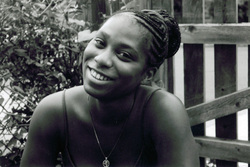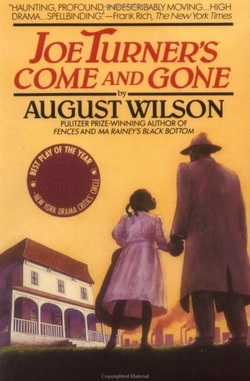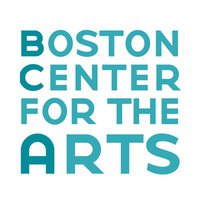 JACQUELINE LAWTON: Why did you decide to get into theatre? Was there someone or a particular show that inspired you? KIRSTEN GREENIDGE: I’ve always been what my family terms “theatrical”, so I used to do plays and musicals in my living room as a kid. I would make my sisters and the neighbor kids be in the shows. The name of our company was Fantasy Theater. We did a lot of fantastical material, and one of my oldest friends in the world, Toby, was really in to the idea of using “shorts” within our pieces. So I’d create, say, a piece about magic crystals and an epic journey and make my sister be some woodland animal in the middle of all that but to break it up, Toby would do a series of shorts about bumbling firemen or something. Our tickets were affordable (sliding scale! Five cents to twenty-five cents! We were cutting edge and inclusive) and our demographic was our parents. My mom wanted me to do children’s theater here in Boston but I was too shy to do this crazy stuff in public, and was and always have been terrified of learning and remembering lines. It is a mental block and I’m fine with that. I enjoy the work of writing much better. I’ve thought of myself as a writer since I was about eight or nine, and even more so after about age eleven. In high school I was really embarrassed I did not write good dialogue so I decided to write only that for two years and strengthen it for my fiction writing. I really never went back. (I am a-okay fine with that, too).  When I was twelve we had a field trip to see August Wilson’s JOE TURNER’S COME AND GONE and that really was a huge turning point for me. I wanted to be a playwright like that. I had no idea women and particularly black women could BE playwrights. Novelists, sure, but playwrights? Now THAT changed when I read A RAISIN IN THE SUN my junior year of high school. And here I am. JL: Next, tell me a little bit about your writing process. Do you have any writing rituals? Do you write in the same place or in different places? KG: Mmmm…I write well under lots of blankets in my bed. But I think one huge myth about writers that has had to be adapted as playwrights live in modern times is that myth of “needing” things to write. While I don’t travel as much as I used to for writing, most of my most intense work happens on the road, in hotel rooms or equity apartments: I have had to train myself to get down to work no matter where I am. I DO have certain things I need, and those have changed and probably will change as I continue writing. I used to love to write to music. Now I find it really distracting. I used to have to do tons of research, now, since I have kids and three days at the library could run me over three hundred dollars if I do not plan it when they’re in school, I’ve had to find other points of origin until my kids get older and are both in school full time. I have to write on a computer. Something funky has gone on with my handwriting and while ten years ago it was quirkily hard to decipher, now it is just illegible 99.9 % of the time. I used to hate writing in coffee shops. I still don’t like it. They are often too cold (why do hippie baristas love to open doors and windows ALL the time?), have music blaring, and precarious internet connections (I go on Facebook mid write often, then go back into the fray). But, yep, since having kids, I do not have the luxury of being able to write in my home. It is either too loud, or the caretaker lets them “find” me and I get interrupted, or I need to get myself out of the kiddie routine and into my own vacuum. I also like to talk. So sitting next to many strangers often is just too difficult, and I find I want to be social, not write. I’ve learned to work through that but it can be hard if a place is full of interesting people. As one might be able to tell, I’m a bit ADD in my approach. I think the only thing that kept my parents from seeking help for me and my attention span is that I can sit for hours doing one thing, and as an adult, that one thing is writing. When I was first living with my husband, who is not a playwright, he had not seen me write. One afternoon, with a deadline looming, I sat to get my work done. Afternoon turned to night and my husband lingered a few feet away. I looked up and was like “WHAT!?” “It’s that you haven’t moved in hours, except your fingers”. If I can find my zone, I’m good. JL: Describe for me all the sensations you had the first time you had one of your plays produced and you sat in the audience while it was performed...what was different about the characters you created? How much input did you have in the directing of that work? KG: The first real play I saw of mine was in college. I won Wesleyan’s Playwright Advancement Award and I got a week or two of rehearsal and a staged reading and two public performances. I was in absolute heaven. The only downside was when an actor had told someone she did not like her part and I found out. I was devastated. However, the experience as a whole was just another thing that made me realize how special this craft is. And that you do not have to act to be a part of it. I didn’t direct that piece. I’m not sure if I would exclude directing from what I want to do. I just know I have so much writing work to be done. There are So. Many. Stories. I can’t think of a discipline shift until I tackle more of this stuff. And also, I enjoy the role of the writer in the room too much. JL: What do you hope to convey in the plays that you create--what are they about? What sorts of people, situation, circumstances, do you like to write about? KG: I like to write about the have nots. The outsiders. Most writers are outsiders in some way so I don’t think this is unique. The Greeks loved “the other” in the theatrical gaze and we as a culture are no different. But I also write specifically about class and race and gender. Can’t get me enough of those. And as someone who went to private schools and lived in a solidly middle class town, yet was always somewhat on the outside of the inside, I think the subject never gets old for me. Being black and a girl and at times really poor I’m really interested in the idea of America and how its realities exist within that idea. JL: Tell us about your play and what inspired you to write it. KG: SPLENDOR was originally a commission for Company One which I called THANKSGIVING, and was presented as part of GRIMM, a collection of fairy tales that Company One produced in the summer of 2010. I was inspired to write about my home—towns like old Arlington, Somerville, old Cambridge…. The term “townie” really relates to Charlestown, but in a generic sense it relates to the older versions of these towns where the Irish and Italians and some Protestants, and even “others” like the Greeks, the Armenians, the blacks, the Jews…all took on a very New England, very Boston sense of character—the accent, the hard knock philosophy—the people in my play are people I grew up with and people I love. When I lived in Iowa I was homesick a great deal. At one point PBS was airing a documentary about the witness protection program and of course, the Boston people were in there because of their ties to Whitey Bulger. I used to sit on my couch and just listen to their accents and cry and be happy all at the same time. In real life I am not sure these people would give me the time of day—racial things being as they sometimes are in Boston—but they felt like home, which complicated and a little wrong, and provocative in that it prodded me to ask myself why I feel these connections to a place where race and class are so entangled and entwined in a way we like to think only happens in the deep south. JL: What do you want audiences to think about after experiencing your play? KG: Oh, I have no idea. I want them to have experienced deep empathy for the characters, and felt catharsis (at least a little bit), and be moved. I want them to be thinking about this play on their rides home or two days later on the bus. But I would not want to impose feelings on them. Catharsis yes, but I don’t want to prescribe that experience. It should mean different things to different people. JL: Now, I’d love to hear your thoughts about working in Boston. Finish this sentence ...
JL: How do you feel the Boston theatre community has addressed the issues of race and gender parity? How has this particular issue impacted you and your ability to get your work produced on the main stages? KG: Wesleyan and Iowa gave me a solid pedigree in terms of training. When I left graduate school I had several literary managers whom I’d met at master classes and festivals in Iowa that respected my work, had gotten to know me a little, and could help me create relationships with them, their theaters, and other theaters, too. I don’t know very many theaters with “coveted” mainstages that will do the work of a new writer or an unproduced play if they have not cultivated a relationship with the playwright in some sense. So my training helped, as well as all the development programs I went to with my plays over the years. Readings and workshops are very much part of the process, even when they don’t led, ultimately, to a production. I think much more can be done to support playwrights of color and women playwrights, in Boston and in the rest of the country. And I feel this support needs to come in the form of support for production. You don’t learn your craft well by doing one night readings. You learn it by going through the process of mounting the thing. And usually that involves a lot of failure, and that is expensive and not something you put on grant applications if you want to get one awarded to you. There are some amazing things happening in Boston right now. ArtsEmerson and the presence of Howlround and the Theatre Commons; the big institutions like the Huntington and the A.R.T., as well as smaller powerhouses like Company One, not to mention places like Central Square Theater, Actor’s Shakespeare Project, New Rep…it’s a healthy list. Much healthier than it was previously. However. There is still much to be done. There are still many voices that do not get heard or represented on our stages. JL: What advice do you have for up-and-coming playwrights? KG: Keep writing and learning. Don’t let anyone tell you you can’t do this. You can. You will not always get praise or success or a living wage for what you do, but keep going. Do not give up. Giving up, becoming apathetic to the craft, is really the only kind of real failure in the theater. JL: What’s next for you as a playwright? Where can we follow your work? KG: I have many commissions I need to finish. So I’ve got a lot of writing to do.
0 Comments
Your comment will be posted after it is approved.
Leave a Reply. |
My BlogI'm a playwright, dramaturg, and teaching artist. It is here where you'll find my queries and musings on life, theater and the world. My posts advocate for diversity, inclusion, and equity in the American Theatre and updates on my own work. Please enjoy!
Categories
All
Archives
June 2020
Reading List
|



